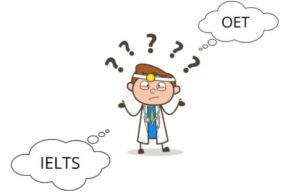
Need to prove your level of English for immigration or work purposes, but you’re confused what English test to take? Before you make the decision, you need to decide which one works the best for you. To make things easy for you we’ve put together a quick guide to help you understand the difference between a general English exam and a profession-specific one.
IELTS
IELTS is still considered as the gold standard is a broader and widely recognized test of the English language and not just workplace specific language. Thus, has a stronger impact on life in the UK outside of work. The topics and content covered will be more general and taken from a range of sources. Preparing for IELTS involves learning huge amounts of vocabulary on a wide range of academic subjects. Test takers should be prepared to read academic texts quickly and effectively, understand lectures and discussions, talk about abstract questions and give opinions in detail.
IELTS is much cheaper than OET and is available in more places. There are also more IELTS test dates available than OET. There are about 3 million IELTS test takers every year and only 25,000 OET takers. This means that there are far more preparation options for IELTS, ranging from a huge number of free options to online courses and private tuition. The range for OET is rather limited.
Something about IELTs that many students find frustrating is that if you fail one of the four skills, you have to take all four again. Whilst for the OET you will only have to repeat the part that you didn’t pass earlier so your entire progress isn’t all lost and you don’t have to start from scratch.
The reason some doctors prefer IELTS beyond just passing a test is because it enables them to speak English confidently outside of their work. This may prove useful especially if they want to aim for a different career trajectory at some point in the future. It may also be due to its broader recognition worldwide. IELTS is recognized by universities, regulatory bodies, immigration authorities and companies in many countries around the world. This includes universities in non-English speaking countries where a course may be delivered in English. There are over 1,100 test centers in over 140 countries.
OET
OET uses profession-specific content. It might come across as easier in some ways because it is more specific to healthcare. You can therefore make use of your healthcare knowledge, vocabulary and experiences. If you are a nurse or a doctor, you will be tested on things related to your profession. Due to its specificity, OET has a far higher pass rate. Preparing for OET involves learning a wide range of healthcare-related and profession-specific language. Health professional should therefore be able to follow, engage with and participate in a variety of clinical scenarios, as well as understand medical texts and talks.
OET is recognized by healthcare regulatory bodies and Higher Education healthcare educators, including those in the UK, Ireland, Australia, New Zealand, Singapore, Dubai, Ukraine and Namibia. There are over 115 test centers in 40 countries.
As a doctor who may have prior experience speaking in English within a medical capacity rather than generally you may want to opt for OET. As the only English language test made specifically for the healthcare industry, it uses real healthcare scenarios. Test takers may feel more confident than an academic English test. Also, as OET replicates the types of communication skills you would need in an actual healthcare setting, it grooms you as a professional too.